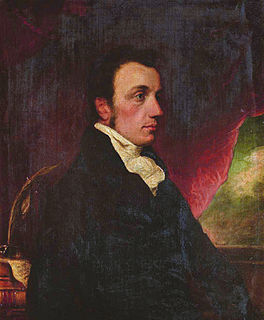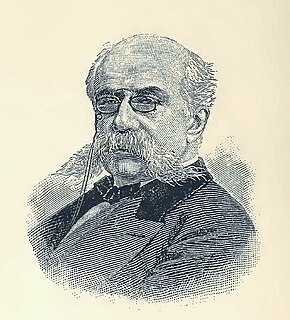Related Research Articles

Edward Foss was an English lawyer and biographer. He became a solicitor, and on his retirement from practice in 1840, devoted himself to the study of legal antiquities. His Judges of England was regarded as a standard work, characterized by accuracy and extensive research. Biographia Juridica, a Biographical Dictionary of English Judges, appeared shortly after his death.
A legal periodical is a periodical about law. Legal periodicals include legal newspapers, law reviews, periodicals published by way of commerce, periodicals published by practitioner bodies, and periodicals concerned with a particular branch of the law.

Amanda Theodosia Jones was an American author and inventor, most noted for inventing a vacuum method of canning called the Jones Process.

Frederick William Hope was an English clergyman, naturalist, collector, and entomologist, who founded a professorship at the University of Oxford to which he gave his entire collections of insects. He described numerous species and was a founder of the Entomological Society of London in 1833 along with John Obadiah Westwood.
The Victoria Medal of Honour (VMH) is awarded to British horticulturists resident in the United Kingdom whom the Royal Horticultural Society Council considers deserving of special honour by the Society.

Thomas Alfred Coward, MSc, FZS, FRES, MBOU, was an English ornithologist and an amateur astronomer. He wrote extensively on natural history, local history and Cheshire.

Edward William Cox known as Serjeant Cox (1809–1879) was an English lawyer and legal writer, who was also a successful publisher. He has been described as "the greatest entrepreneur of 'class' journalism".
Jabez Allies was an English folklorist and antiquarian. He was one of the earliest writers on folklore.
George Richardson Porter (1792–1852) was an English statistician. He became head of the statistical department of the Board of Trade.
Solicitors Journal is a monthly legal journal published in the United Kingdom by the International In-house Counsel Journal, Cambridge. It was established in 1856 and covers "practical and independent updates and analysis about the latest developments affecting the legal profession." The magazine has its headquarters in Cambridge.
Harold Mattingly was a British art historian and numismatist, who specialised in the history of Ancient Rome, especially Etruscan and Roman currency. His son, Harold B. Mattingly (1923-2015) was also a celebrated numismatist, and President of the Royal Numismatic Society 1999-2004.
Stone's Justices' Manual is a book published by LexisNexis Butterworths. It is "the standard work on summary procedure". It displaced Burn's Justices of the Peace as the standard work on that subject from 1850 onwards. By 1914, it was old, well-established and formidably large.
Charles Sprengel Greaves MA QC (1802–1881), eldest son of William Greaves MD (1771–1848) of Mayfield, Staffordshire, by his first wife, Anne-Lydia, was born at Burton on 18 July 1802. He entered Rugby School on 18 July 1816 and matriculated at Queen's College, Oxford on 27 February 1819, graduating BA on 25 November 1823 and MA on 13 April 1825. Greaves was called to the bar by the Society of Lincoln's Inn on 22 November 1827, entered the Inner Temple ad eundem in 1828, and attended the Oxford Circuit and Gloucester Sessions. He became Queen's counsel on 28 February 1850, but by then he had for many years ceased to practise. He became a bencher of Lincoln's Inn on 15 April 1850. He was a magistrate and deputy lieutenant for Staffordshire, and also a magistrate for the county of Derby. He was the draftsman of the Criminal Procedure Act 1851 and the Criminal Law Consolidation Acts 1861. He became a Secretary to the Criminal Law Commission in 1878. He died at 11 Blandford Square, London, on 3 June 1881.
John Bruce Williamson KC (1859–1938) was a British barrister and historical author.
Clarence Gabriel Moran, barrister and writer, was educated at Wadham College, Oxford, where he obtained a third in Mods in 1897, and graduated BA in 1899. He obtained a first class pass in Roman law in the Trinity Bar Examinations, 1901. He became a barrister of the Inner Temple in January 1902. He was an examiner of the court, empowered to take examination of witnesses in all Divisions of the High Court. He was assistant deputy coroner for the South London District from 1927. He is said to have been "well known" and "noteworthy".
Charles Beavan (1805-1884) was a British barrister and law reporter.
George Richard Corner (1801–1863) was a 19th-century English antiquarian. He published many articles on the history of Southwark, across several journals, and two books on the borough.

Charles Benjamin Norton was an American archivist, early American historian and publisher of books, a dealer in rare books and one of the few individuals in his day that made arduous efforts to preserve early American history in the form of published manuscripts, books, diaries, letters, etc. He founded Norton's Literary Letter, a numismatic journal, in 1857. Norton also served as a Lieutenant-Colonel on the staff of General Fitz John Porter during the American Civil War. After the war, he kept abreast of the post-war American inventions and developments of ordnance and munitions and authored and edited several books outlining this advent.
The Practical Statutes of the Session, later called Paterson's Practical Statutes, was published from 1850 onwards and included annotated copies of Acts of the Parliament of the United Kingdom passed between 1849 and 1943.
References
- Foster, Joseph. "Stroud, Frederick" in Men at the Bar. Second Edition. 1885. Page 452.
- "Obituary" (1912) 2 Weekly Notes 53 Google Books:
- "Legal Obituary" (1912) 132 Law Times 256 Google Books
- "Obituary" (1912) 47 Law Journal 27 Google Books
- "Practical Law affecting. (F. Stroud)" in "Bills of Sale" (1888) 1 An Index to Legal Periodical Literature 58
- ↑ "Stroud, Frederick", Who Was Who, A & C Black, an imprint of Bloomsbury Publishing plc, 1920–2007; online edn, Oxford University Press, Dec 2007 accessed 19 Jan 2014
- 1 2 3 Charles Welch and W T Pike. "Frederick Stroud" in London at the Opening of the Twentieth Century. Issue 15 of Pike's New Century Series. 1905. Page 307. Google Books.
- ↑ For reviews of this book, see "The Law Library" (1862) 37 The Law Times 180 (1 February); "Reviews" (1862) The Jurist, New Series, Volume 8, Part 2, page 217 at 219; "Reviews" (1862) 6 Solicitors Journal and Reporter 216 (25 January)
- ↑ "Practical Law Affecting Bills of Sale" (1862 to 1863) 7 Solicitors Journal and Reporter 80, 101, 122, 141, 161, 182, 199, 219, 238, 257 and 280 (This work was published as a serial in the periodical from 6 December 1862 to 14 February 1863).
- ↑ (1913) 48 The Law Journal 4
- ↑ "78. Philip and Mary, Half-crown" (1972) 40 British Numismatic Journal 166
- ↑ L A Lawrence (1907) 4 British Numismatic Journal 316 : "Mr. Stroud has a foreign coin about the size of a dollar, but cut down, on which the obverse of No. 67 has been impressed. This is probably intended for a half crown."
| | This law-related article is a stub. You can help Wikipedia by expanding it. |